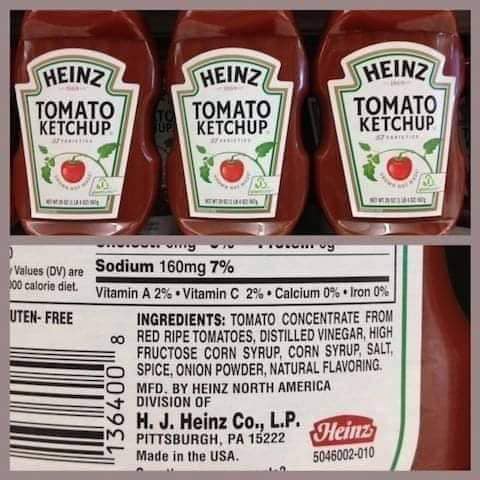Ketchup is one of those staple condiments that seems to find its way into almost every American household. Whether you’re dipping fries, topping off a burger, or adding a little extra flavor to your scrambled eggs, it’s hard to deny its appeal. Among all the brands out there, Heinz is arguably the most iconic. It’s been around for generations and has become the go-to ketchup for millions.

But while Heinz Ketchup may be a favorite in terms of taste and tradition, what many consumers don’t realize is that it hides a serious health concern within its familiar red bottle. One of the main ingredients in Heinz Ketchup is high fructose corn syrup (HFCS), a sweetener that has been heavily scrutinized for its negative effects on human health. Unlike natural sugar, HFCS is a highly processed sweetener made by converting corn starch into glucose and then into fructose through the use of enzymes.
The result is a syrup that’s much sweeter than regular sugar, and unfortunately, also much worse for your body. Even more concerning is that the corn used in the production of HFCS is often genetically modified, adding another layer of health concerns for those trying to avoid GMOs. The consumption of HFCS has been linked to several serious health issues, including spikes in blood sugar, fatty liver disease, insulin resistance, and an increased risk of obesity and type 2 diabetes.
It doesn’t stop there—studies have shown that HFCS can also weaken the immune system and increase the likelihood of developing heart disease over time. Despite these known risks, HFCS remains a common ingredient in many processed foods, and ketchup is one of the biggest offenders. One particularly eye-opening study conducted by researchers at Princeton University explored the differences between HFCS and regular table sugar. In the study, rats were divided into two groups—one was given water sweetened with HFCS, and the other group received water sweetened with sugar. Both groups consumed the same number of calories. However, the results were startling. The rats that consumed HFCS not only gained more weight than their sugar-consuming counterparts, but they also developed higher levels of body fat, especially around the abdomen, and showed elevated levels of triglycerides in their bloodstream.
These indicators are known risk factors for metabolic syndrome, a condition that significantly raises the risk for heart disease, stroke, and diabetes. What makes these findings even more troubling is the fact that ketchup is often consumed in small but frequent amounts, especially by children who are more vulnerable to the long-term effects of poor dietary habits. A few squirts here and there might not seem like much, but when you’re regularly consuming a condiment filled with HFCS, the negative effects can add up quickly over time. It’s not just about calories or weight gain—it’s about what those hidden ingredients are doing to your body in the long run. Fortunately, more and more health-conscious brands are beginning to offer ketchup options that do not contain HFCS. Some use natural sweeteners like cane sugar or honey, while others go the organic route to avoid GMOs altogether. You can also make your own ketchup at home using fresh ingredients and natural sweeteners, giving you full control over what goes into your food. Not only is it healthier, but homemade ketchup can also be tastier and more satisfying, especially when you know it’s free from harmful additives. In conclusion, while Heinz Ketchup may hold a special place in many people’s hearts and kitchens, it’s time to take a closer look at what you’re actually putting into your body. With high fructose corn syrup as a key ingredient, the risks far outweigh the flavor. Backed by scientific research and expert concerns, it’s clear that avoiding HFCS is a smart move for your long-term health. So next time you reach for that bottle of ketchup, consider choosing a healthier brand—or better yet, whip up your own version at home. Your body will thank you, and your taste buds just might too. When it comes to Heinz Ketchup, skipping it could be one of the simplest and smartest health choices you make.





